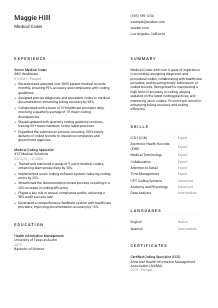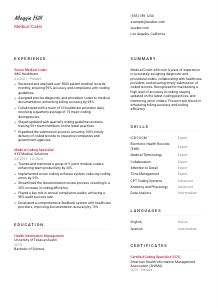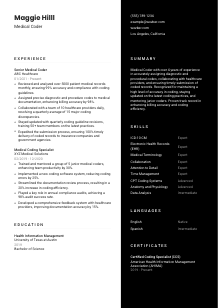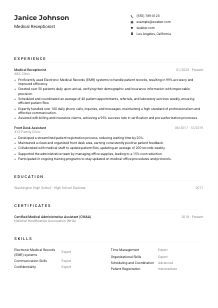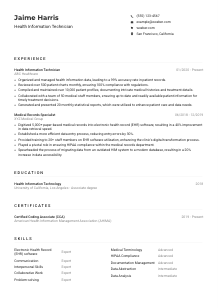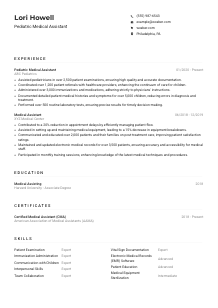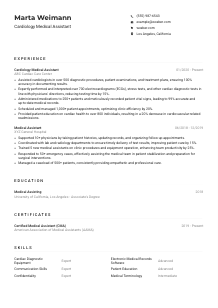Medical Coder Resume Example
Cracking complex codes, but your resume seems scrambled? Dive into this Medical Coder resume example, crafted with Wozber free resume builder. See how smoothly you can translate your coding genius to meet job specifics, keeping your career prognosis as healthy as can be!
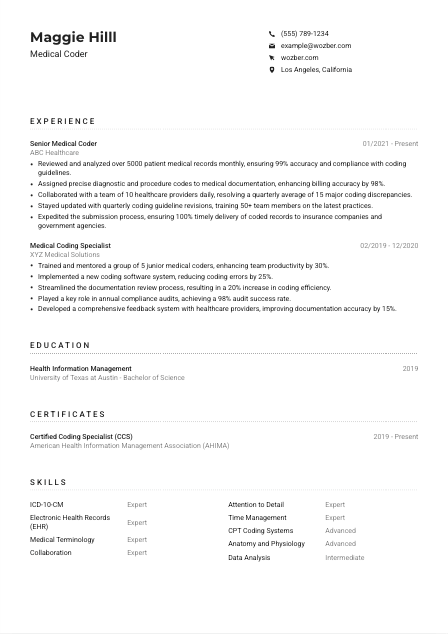
How to write a Medical Coder resume?
Greetings, aspiring Medical Coder! In the intricate world of medical coding, your resume is more than a simple document—it's your gateway to a vibrant career. As you navigate through the rigorous demands of this profession, a well-crafted resume is indispensable. At Wozber, we're all about empowering you to create a resume that not only meets but exceeds expectations, particularly when it's about capturing the nuances of a Medical Coder role.
Using our free resume builder, this guide will walk you through creating an ATS-compliant resume that stands out. Ready to start? Let's weave your professional narrative into a resume that promises a thriving career ahead.
Personal Details
The Personal Details section is your initial handshake with potential employers. For a Medical Coder, it's about presenting yourself in a manner that resonates with the profession's precision. With attention to detail being a cornerstone in medical coding, reflect this in how you layout this section.
1. Your Name, Loud and Clear
Begin with your name in a clear, professional font. Consider larger typography to make it stand out—a nod to your attention to detail.
2. Title it Right
"Medical Coder"—ensuring you include this title below your name aligns your application with the position right off the bat, showcasing your focus.
3. Essential Contact Info
- Phone Number: List your most reachable number, verifying for accuracy. In medical coding, accuracy isn't just a skill—it's a requirement.
- Professional Email Address: Your email should mirror your professionalism. Stick to the firstname.lastname@email.com format, reflecting your orderly nature.
4. Locale: Los Angeles, California
Stating your location as 'Los Angeles, California', immediately lets the employer know you're in proximity, cutting through the clutter.
5. A Dash of Professional Online Presence
Include your LinkedIn profile to extend your professional introduction. In the realm of medical coding, your digital footprint speaks volumes.
Takeaway
Consider the Personal Details section as your professional handshake. It should be crisp, clear, and reflective of the medical coder's precisionist nature. This is your textual business card—make every word count.





Experience
In medical coding, your experience is your proof of expertise. Showcasing your trajectory in this field is critical. This section is about narrating your journey in a way that directly aligns with the job's demands. Let's decode the experience section for a perfect fit.
- Reviewed and analyzed over 5000 patient medical records monthly, ensuring 99% accuracy and compliance with coding guidelines.
- Assigned precise diagnostic and procedure codes to medical documentation, enhancing billing accuracy by 98%.
- Collaborated with a team of 10 healthcare providers daily, resolving a quarterly average of 15 major coding discrepancies.
- Stayed updated with quarterly coding guideline revisions, training 50+ team members on the latest practices.
- Expedited the submission process, ensuring 100% timely delivery of coded records to insurance companies and government agencies.
- Trained and mentored a group of 5 junior medical coders, enhancing team productivity by 30%.
- Implemented a new coding software system, reducing coding errors by 25%.
- Streamlined the documentation review process, resulting in a 20% increase in coding efficiency.
- Played a key role in annual compliance audits, achieving a 98% audit success rate.
- Developed a comprehensive feedback system with healthcare providers, improving documentation accuracy by 15%.
1. Align with Job Requirements
Analyzing the job description, highlight experiences that mirror the requirements such as 'reviewed over 5000 patient medical records monthly, ensuring 99% accuracy.'
2. Present Your Professional Path
Chronologically list your roles, spotlighting your progression. For each, include your title, the organisation, and duration of your tenure.
3. Detail Your Impact
Showcase responsibilities and achievements that echo the job requisites. Use action verbs to illustrate your contributions, like 'collaborated,' 'reviewed,' and 'implemented.'
4. Quantify Where You Can
In medical coding, numbers speak. Quantifying achievements, such as 'enhancing billing accuracy by 98%' offers tangible proof of your capabilities.
5. Relevance is Key
Keep your content focused on medical coding specifics, omitting unrelated experiences. Every detail should reinforce your suitability for the Medical Coder role.
Takeaway
Your experience is the bedrock of your medical coding resume. It's an illustration of your journey, sprinkled with achievements that make you an ideal candidate. Use this section to convince the hiring manager that you're the key to their coding conundrums.
Education
Your education underscores your theoretical foundation in medical coding. It's more than a list; it's an opportunity to underscore how prepared you are, academically, for the challenges of medical coding. Let's sculpt the education section to reflect your readiness.
1. Identify Essential Education
Your degree, especially if it's in Health Information Management, immediately signals your foundational knowledge. Clearly list your degree, institution, and graduation date.
2. Simplify Structure
Maintain clarity with a straightforward listing of your education, ensuring easy scanning for ATS and hiring managers alike.
3. Degree Specifics
For a Medical Coder role, listing a degree relevant to healthcare, like 'Bachelor of Science in Health Information Management,' directly aligns with professional expectations.
4. Relevant Courses and Extracurriculars
Should your degree be in a broader field, highlight pertinent courses like 'anatomy' or 'medical terminology' to bridge to the role's requirements.
5. Other Academic Achievements
Mention honors or club participation if they add value to your profile as a Medical Coder, showcasing your commitment to the field.
Takeaway
This section is about more than fulfilling a requirement; it's about illustrating your preparedness to excel as a Medical Coder. Craft your educational background in a way that builds confidence in your capabilities.
Certificates
In the specialized field of medical coding, certifications speak volumes about your professional dedication and expertise. They are not just accolades; they're evidence of your commitment to maintaining high standards. Let's examine how to spotlight these in your resume.
1. Highlight Relevant Certifications
Directly draw from the job description, emphasizing certifications like 'Certified Professional Coder (CPC)' or 'Certified Coding Specialist (CCS)' to match preferences.
2. Selective Listing
Prioritize listing certificates that underscore your proficiency in medical coding, demonstrating your commitment to continuous learning and excellence in the field.
3. Transparency with Dates
Include the date of certification to convey the currency of your expertise. This is particularly relevant in fields like medical coding where standards evolve.
4. Stay Current
Medical coding is ever-evolving. Emphasize ongoing learning by updating certificates and pursuing new ones relevant to the profession.
Takeaway
This section is your chance to shine brightly in the competitive field of medical coding. Highlight certifications to show that you not only meet the standards but are also committed to staying at the forefront of medical coding practices.
Skills
Your skills are the core components of your medical coding toolkit. In this section, we align your skills with job expectations, showcasing your competence in this meticulous field. Let's craft a skills section that speaks volumes.
1. Dissect the Job Description
Start with a thorough analysis of the job posting, identifying explicit and implicit skills such as 'ICD-10-CM' and 'Attention to Detail.'
2. Curate a Strategic List
From 'CPT Coding Systems' to 'Electronic Health Records (EHR)', list hard skills directly from the job description alongside soft skills like 'Time Management' to paint a complete picture of your capabilities.
3. Organized and Selective
Prioritize relevance over quantity. An orderly list of your top skills makes it easier for hiring managers and ATS to recognize your suitability for the role.
Takeaway
This section is an impactful snapshot of what you bring to the table. Approach it with the mindset of showcasing your proficiency in a concise yet compelling manner. Your skills are potent; make sure they resonate with the Medical Coder role.
Languages
In the progressively global field of healthcare, language proficiency can significantly enhance your resume. Whether you're communicating with diverse teams or understanding multicultural patient records, languages can be a valuable asset. Let's articulate your linguistic capabilities.
1. Job Description Review
Start by assessing whether the role specifically mentions language skills. 'Strong skills in both verbal and written English' was a clear requirement for our Medical Coder role.
2. Emphasize Required Languages
Position English proficiency at the forefront, as specified, but don't shy away from listing additional languages which can broaden your appeal in diverse environments.
3. Showcasing Multilingual Skills
If proficient in other languages, like Spanish, list them. This can showcase your versatility and ability to engage with multi-lingual documents or teams.
4. Be Honest with Your Proficiency
Clearly outline your level of competency. Being upfront about your ability to communicate in different languages sets clear expectations.
5. Role Relevance
For roles interacting with international codes or globally spread teams, your multilingual skills can provide an essential edge.
Takeaway
Your proficiency in multiple languages is a testament to your adaptability and readiness for a global workplace. Highlighting this skill set thoughtfully can make your Medical Coder resume stand out in a crowded field.
Summary
The summary is your resume's opening statement, an opportunity to encapsulate your professional identity. For a Medical Coder, it's about succinctly presenting your qualifications, experience, and why you're the ideal candidate. Let's distill your essence into a powerful introduction.
1. Decode the Job Essence
Absorb the job description, identifying the core requirements and how your background makes you the perfect fit.
2. Start with a Hook
Introduce yourself as a Medical Coder, highlighting your years of experience and areas of expertise, such as 'accuracy in coding' and 'timely submission of coded records.'
3. Tackle Key Requirements
Weave in specifics from the job description, demonstrating how your skills and experiences align perfectly with the role's demands.
4. Keep it Tight
Aim for a punchy, engaging summary that invites the hiring manager to delve deeper into your resume. Remember, clarity and conciseness are key.
Takeaway
Consider your summary as the elevator pitch of your professional story. It's your chance to capture the hiring manager's attention, setting the stage for the detailed excellence to follow. Tailor it well, and let it reflect your prowess as a Medical Coder.
Embrace Your Medical Coder Journey
Congratulations! You've now crafted a resume that aligns perfectly with the heart of medical coding. Remember, your resume is more than words on a page—it's a testament to your dedication and capability in the field of medical coding. Use Wozber's free resume builder, ATS-friendly resume template, and ATS resume scanner as your secret weapons to ensure your resume is not only visually appealing but also ATS-compliant. Let this journey be the launchpad to your dream role.
With precision and care, you've made your mark. Now, take the next step with confidence. The healthcare world awaits your expertise.

- Minimum of 2 years of experience in medical coding using ICD-10-CM and CPT coding systems.
- Proficiency in using coding software and electronic health record (EHR) systems.
- Strong understanding of medical terminology, anatomy, and physiology.
- Certification as a Certified Professional Coder (CPC) or Certified Coding Specialist (CCS) preferred.
- Excellent attention to detail and high level of accuracy in coding assignments.
- Strong skills in both verbal and written English are essential.
- Must be located in Los Angeles, California.
- Review and analyze patient medical records to ensure accuracy and compliance with coding guidelines.
- Assign appropriate diagnostic and procedure codes based on medical documentation.
- Work collaboratively with healthcare providers to resolve documentation and coding discrepancies.
- Stay updated with current coding practices, guidelines, and reimbursement procedures.
- Ensure timely submission of coded records to insurance companies and government agencies.





